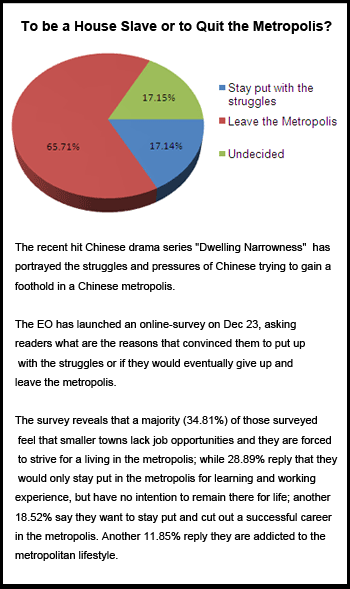

Issue 449, Cover, December 21, 2009
Translated by Tang Xiangyang
Original article: [Chinese]
The recent ban of a hit Chinese television series - Dwelling Narrowness (蜗居), which centered around China's skyrocketing property prices and the pressure on its middle class to put up mortgages - highlighted the concerns of Chinese authorities over widespread public discontent against steep home prices.
The too-close-to-reality drama series struck chord with Chinese' growing anxiety in owning a house as the real estate market bubbling, and the term "house slaves" (房奴) - referring to those burdened by mortgages - came into being.
The Chinese government has recently reacted to the swelling public resentment - aside from halting a drama series that could potentially fanned the discontent, it also announced a series of measures to cool the red-hot property market.
Government Intervention
 On Dec 17, five ministerial agencies – including the Finance Ministry and the Land and Resource Ministry – jointly issued a set of guidelines, requiring developers to make a minimum down payment of 50% on land purchases from the government and limiting the payment term to one year.
On Dec 17, five ministerial agencies – including the Finance Ministry and the Land and Resource Ministry – jointly issued a set of guidelines, requiring developers to make a minimum down payment of 50% on land purchases from the government and limiting the payment term to one year.
A few days later, the government launched a crack-down on land hoarding by developers, saying the land use right of developers would be revoked if they failed to start construction within two years after bidding a plot of land.
These moves were aimed at restraining developers from bidding land at sky-high prices and hoarding land inventories for future appreciation, thus preventing the cost from eventually being transferred to the final products.
Prior to that on Dec 9, the State Council decided to re-impose a sales tax on homes sold within five years, after cutting the period to two years in January. The move is meant to curb property speculation and reign in "excessive" growth in real estate prices.
Following these measures, the stock prices of Chinese real estate companies slumped, as the market anticipated more interventionist measures from the government to control property prices.
"The trading volume of both new and second hand units have recently gone down," said a real estate agent in Beijing, suggesting that house buyers were holding back their purchasing plan to wait for further measures in bringing down the property prices.
More Measures in the Pipeline?
Contrary to last year's slump, China's real estate market has rallied on the government's four-trillion-yuan stimulus package and loose monetary policy in 2009, with the average price in some major Chinese cities surging some 60% over the past eleven months.
Economists and market analysts alike have increasingly warned of a property market bubble, and the Chinese government finally acted towards the end of the year, shortly after the Dubai debt crisis which was widely blamed on the real estate bubble.
As the Chinese government acted by first tightening the noose around developers' liquidity flow, industry observers suspected that the next move could be the enforcement of the "90/70" policy, which requires developers to have 70% of their newly-constructed residential units with a built-up area under 90 square meters.
In recent times, there have been public outcry over developers skewing towards constructing large and pricey homes, beyond the affordability and the need of the working class. The "09/70" policy was introduced in 2006 but was never strictly enforced.
Zhu Zhongyi, Chairman of China Property Association, said the "90/70" policy faced implementation obstacles, as land supply and the real estate structure in each province differed.
"It's better to deploy interest rate and tax-related measures rather than administrative order to dictate how the real estate market should develop," said Zhu, who was also a former director with the Ministry of Housing and Urban-Rural Development.
Tightening Credit
A record 9.2 trillion yuan (1.3 trillion USD) of loans in the first 11 months of this year have been attributed as one of the main factors in pushing up the property prices.
When the global financial crisis hit last year, in an attempt to spur domestic spending, China introduced preferential policy for home loans that offered 30% off the benchmark interest rate.
Now that the government has decided to reign in property prices, housebuyers expressed concern that the policy might be discontinued.
Though there was no official directive in ceasing the policy, some Chinese banks recently tightened the offer. For instance, China Construction Bank only offered the reduced rate to first time housebuyers who made a downpayment of 40% or more.
A source close to the China Banking Regulatory Commision (CBRC) told the EO that the authorities had no intention to cease the policy as yet. The source said the government hesssitant in halting the policy as doing so could potentially hurt the lower income group.
Though banks continue to release "discounted" loans but they have become more stringent in issuing new mortgages.
Kang Sheng, general manager of an agency specialized in providing mortgage guarantee, said banks became more selective after the CBRC repeatedly called for improving risk control measures to prevent loan default rate from rising.
Despite the recent measures, critics said those were feeble attempt to cool the real estate market. "Only words, no firm policy," said one market analyst.
A source from the CBRC said:" It's difficult to curb the property bubble due to three main reasons -- first, excessive liquidity; second, the economy is expected to remain strong next year; third, it's hard to tell how determine the central government is."

